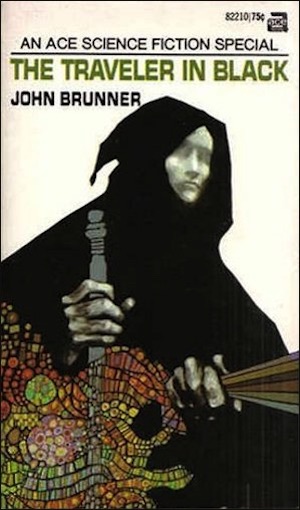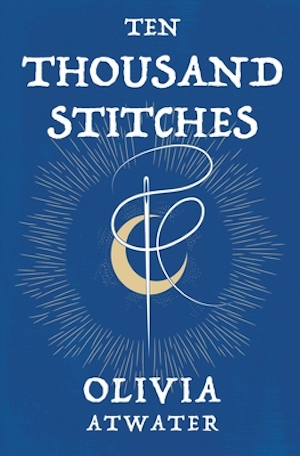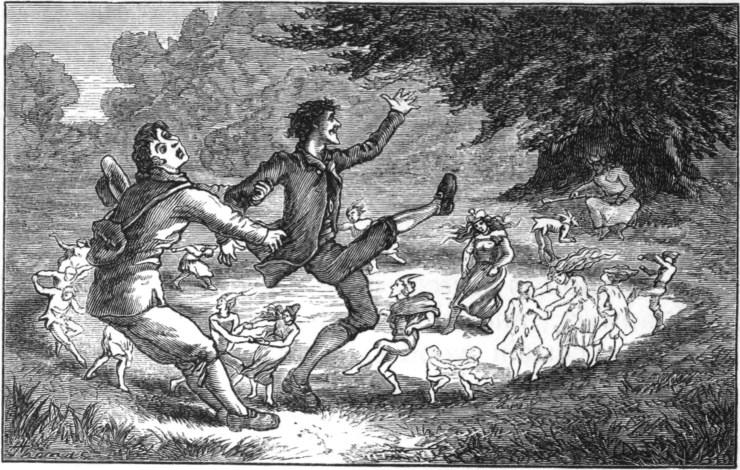We sometimes face challenges that appear insurmountable by mundane means. One possible solution: whip out some chalk, inscribe a summoning circle, appeal to the powerful entity that appears, then sit back to enjoy the bounty that follows. Authors being authors, the bounty generally consists of disastrous complications emerging from insufficiently (or excessively) precise phrasing.1
Since watching people step on rakes clearly labeled “Do not step on rake!” is amusing, authors have dreamed up many stories about misguided characters appealing to dread beings or accepting magical aid. Here are five examples.
The Traveler in Black by John Brunner (1971)

To quote:
[The Traveler in Black] had many names, but one nature, and this unique nature made him subject to certain laws not binding upon ordinary persons. In a compensatory fashion, he was also free from certain other laws more commonly in force.
The Traveler is a reality-warper, able to deliver to the unfortunates who catch his attention exactly what they wished for. What they wish for is almost never what they really want. Prudent inhabitants of a magical realm would eschew the Traveler’s services…which is why the Traveler is prone to eavesdropping on strangers and then providing them with unrequested marvels beyond human ken.
The Traveler is something of a trickster and it helps when reading this collection to have a dark sense of humour. That said, he is also forwarding a great work. His victims are the raw material from which a new order will arise.
Kiki’s Delivery Service by Eiko Kadono (1985)

Unlike the Traveler in Black, witch Kiki is entirely benevolent. Born to a witch mother and human father, Kiki has embraced her mother’s heritage. Now, thirteen-year-old Kiki must endure a rite of passage to earn recognition as a witch: travel alone to a new town and there make herself useful to her new neighbors.2
The catch is that of all the witchy skills Kiki could have learned, Kiki commands just one. She knows how to fly on a broom. The trick will be to find some need that can be filled by a girl on a broom. Insightful readers may be able to guess what that niche could be from the novel’s title.
This upbeat novel left me tremendously concerned about the preservation of magic in Japan. Although Kiki’s father is archiving everything his wife knows, it’s clear that skills are being lost generation to generation. As well, the rite of passage seems like one many witches might not survive: if angry mobs don’t turn on them, long falls off flying broomsticks could do them in.
The Melancholy of Haruhi Suzumiya by Nagaru Tanigawa (2003)

High-school student Kyon has long ago reconciled himself to the fact that the world is utterly mundane. He might dream of time travelers, aliens, psychics, and living gods, but the reality in which he is forced to live is a gray world of joyless normality. This view is clear, simple, and wrong, as Kyon discovers after he falls into the orbit of his charismatic classmate Haruhi Suzumiya.
Where Kyon has given up on his dreams, Haruhi is determined to find them. She seeks wonder in a mundane world. To this end, she forms the SOS Brigade (the Save the World by Overloading It With Fun Haruhi Suzumiya Brigade), whose mission it is to find the time travelers, aliens, sliders, and psychics. Little does she suspect how successful SOS already is. Kyon aside, each member of the club is just such a time traveler, alien, slider, or psychic. Each of these folks has their own take on Haruhi, but they agree on one thing: godlike Haruhi can never know how powerful she is; if she were to learn, the universe itself might not survive.
Readers may wonder how self-centered an oblivious living god can be. The answer is “very.” Haruhi is (at least in the early volumes of this series) a god with narcissistic personality disorder. That’s bad. Over the course of the series she does learn and improve, at least by comparison to her starting point.
(Side note: Is it weird that the one person who got what they wished for in this series was Kyon, the one member of SOS who is supposed to be completely normal?)
The Elder Sister-like One by Iida Pochi (2016)

Orphaned at five, Yuu has been passed from relative to relative. Seen as an unwanted burden, Yuu has been denied the loving household he craves. Succor appears in the form of his ailing uncle’s secret occult research.
While searching for his uncle’s health card, Yuu finds himself face to face with Shub-Niggurath, the Black Goat of the Woods With a Thousand Young. Shub-Niggurath offers the usual deal: a wish in exchange for Yuu’s soul. Naïve Yuu concludes that the extremely busty, scantily dressed, be-tentacled, obviously demonic woman must be an angel and wishes for her to be his big sister.3 The eldritch horror isn’t certain how to proceed, but wishes are wishes and she will do her best.
Readers may wonder why a soul-eating eldritch horror would appear in the form this one does. Marketing. As far as I can tell, this manga began as explicit adult content but was reimagined as merely risqué when the found-family angle proved more popular than the sex stuff. That said, it is probably best to regard this manga as borderline X-rated and not appropriate for all ages.
Ten Thousand Stitches by Olivia Atwater (2020)

A maid’s lot in Regency England is an unhappy one. A kind word from toff Benedict to servant Effie leaves Effie infatuated with the not obviously monstrous Benedict. The vast social gulf between maid and aristocrat ensures that nothing can come of this, absent a miracle. Or a Faerie Godfather.
Lord Blackthorn is determined to do good and the faerie lord isn’t going to let his shaky grasp of what “good” is, as humans define it, get in the way. With Lord Blackthorn’s eager, poorly informed assistance, Effie is assured true love…or if things go wrong, as well they might, a life spend serving Lord Blackthorn in his faerie realm.
Lord Blackthorn is a sincere nincompoop, not a trickster looking for cheap help. Lord Blackthorn is also an example of how hard it can be to distinguish well-meaning ignorance from overt malice.
***
People have been wishing for magical loopholes ever since humans conceived of magic; for just as long, tale-spinners have been amusing audiences with stories about magical assistance gone wrong. Five examples only scratch the surface, of course. If you have favorites I haven’t included, please mention them in comments, which are, as ever, below.
In the words of fanfiction author Musty181, four-time Hugo finalist, prolific book reviewer, and perennial Darwin Award nominee James Davis Nicoll “looks like a default mii with glasses.” His work has appeared in Interzone, Publishers Weekly and Romantic Times as well as on his own websites, James Nicoll Reviews (where he is assisted by editor Karen Lofstrom and web person Adrienne L. Travis) and the 2021 and 2022 Aurora Award finalist Young People Read Old SFF (where he is assisted by web person Adrienne L. Travis). His Patreon can be found here.
[1]Special mention to SPI’s long-out-of-print tabletop fantasy roleplaying game “Dragonquest,” in which some magicians were Greater Summoners. Greater Summoners were adept at summoning great and terrible beings. They were significantly less adept at controlling the annoyed demons after they appeared. In every DQ campaign I joined, players were agreed that as soon as someone revealed that they were a Greater Summoner, it was best to get them out of the game. Cosh them with a paving stone, wrap them in magic-quenching iron chains, then toss them into the nearest river (piranha-filled, if possible).
[2]Kiki is supposed to be actually useful, not “ha ha I interpreted your wish not to do laundry as a wish to be turned into a newt” useful.
[3]Yuu is not an idiot. He does know on some level that his onee-chan is really an oni and one day she will kill and eat him. However, his desperation to have a family is such that he’s willing to play along. (If that seems terribly sad to you, avoid finding out what the Haruhi Suzumiya supporting character Yuki Nagato thinks a happy home life looks like.)











“The Wish” is one of the best episodes of BtVS. (Tor seems to have removed the Buffy rewatch homepage)
https://www.tor.com/2012/06/11/buffy-the-vampire-slayer-rewatch-wish-upon-a-demon/
Must here mention a favorite fantasy short story of my childhood, “The Half-Pint Jinni” by Maurice Dolbier. (In a book of his collected stories with the same title.) The small jinni can only grant a half a wish, leading to fun attempts to wish for double what one wants. “‘Would we need algebra?’ asked the jinni worriedly. ‘Because I’m rather stupid when it comes to algebra.'” (This story pre-exists the Edward Eager book Half Magic.)
I am about a month ahead on tor pieces, which in this case is a pity because had I read volume 9 of Delicious in Dungeon, I’d have talked about the deal dungeon masters make for power in this. It’s not all bad: they want for nothing.
Does “slider” need clarification? “Sliders” was a TV show title where people leapt between parallel universe Earths, mostly trying to get back to their original home. They were the “sliders” – I think. But “slider” also means a small hamburger sausage in a bread roll.
It did not occur to me to wonder if Haruhi was looking for people who were secretly small hamburgers.
“Whip out some chalk”, for some reason, immediately made me think of Niven’s “Convergent Series”, which I don’t think is an example at all: the protagonist seems to have no reason for summoning the demon beyond finding out if it would actually work, and the wish they ask for seems to be a spur of the moment decision of no real value (except, along with their academic subject, it just happens to allow them to escape the other half of the bargain).
Yes, the Niven example is what immediately leaped to mind for me, and I agree it’s not actually this trope.
It’s that terribly rare thing, a story where the human wins — at least to the extent of surviving decently intact (spoiler!).
I’ve been reading a trilogy by Ian Tregillis, called the Milkweed Triptych, which begins with Bitter Seeds. A crazed Nazi doctor has created a set of people with super powers (telekinesis, invisibility, clairvoyance, etc), and Hitler’s Wehrmacht are overrunning Europe and on the verge of invading Britain. MI6 learn of these supermen and enlist the aid of the last of England’s warlocks to negotiate with powerful supernatural entities to overcome the seemingly unstoppable Nazi advance. But negotiating from a position of weakness with forces older than the Universe may not have the desired results….
I found the first book grim but fun and the second (The Coldest War) not bad, but am finding the third (Necessary Evil) quite the slog. It may be that I just despise the main protagonist as an utter prat, or that I am finding his constant, constant, constant introspection about his family, his lost love, his guilt over the past, and on and on and on just a bit hard to stomach. Your milage, as always, may vary.
When I was going through my project of reading and blogging about every issue of Unknown, I grew very familiar with the stock “deal with the devil” story, whose rules are basic and straightforward.
The dramatic situation will be resolved by re-interpreting or otherwise exploiting some minor technicality in the agreement.
– If the protagonist is sympathetic, this technicality will work in their favour.
– If the protagonist is a jerk, this technicality will deliver them to as karmically ironic a fate as the author can manage.
So, for example, the protagonist of Anthony Boucher’s “Sribedegibit” is an OK sort of guy, so when he accidentally makes a wish that curses him to commit a crime every day or the eponymous demon will devour him, he gets to exploit the technicality that, if he refuses to commit a crime, this is tantamount to suicide, and suicide itself is a crime, so everything ends happily and Anthony Boucher hopes very hard that you haven’t noticed that this is the plot of Gilbert & Sullivan’s Ruddigore. Whereas the protagonist of Malcolm Jameson’s “Blind Alley” (in the very same issue, which just shows how often Unknown went to this particular well) is a very nasty old man indeed, so when he arranges for the devil to send him back in time to the halcyon days of his youth, he gets a salutory and fatal reminder that nostalgia isn’t what it used to be. These days, you could probably train an AI up to write Unknown-style deal-with-the-devil stories. (It would be churlish to suggest that at least that would be an improvement on Malcolm Jameson.)
O’course there’s Robert Bloch’s Hugo-winning ‘That Hell-bound Train;” several (if I’m not mistaken) stories by John Collier; and, most weird of all, Piers Anthony’s early (and therefore good) fixup novel Prostho Plus, in which a dentist captured into, well, dental servitude by aliens releases a djinn (well, actually a robot) who has sworn to kill the person who releases him, but also to grant them a wish, as long as it doesn’t conflict with the killing part. He gets a robot bodyguard out of the deal.
W. W. Jacobs’ “The Monkey’s Paw” comes to mind here also..
Steve Wright @9:
John Wyndham had a similar idea. Devil shows up, offers an old guy the opportunity to rewind his life to the years of his youth. Old guy in his young body is amazed, starts acting differently, plans to change things (most notably prevent the assassination of Franz Ferdinand).
Devils get a complaint from the angels that they’ve screwed up. They were supposed to send the guy back, but with all of his memories scrubbed. So he’d act as he did before, and not change the timeline. Devils apologize, wind the protagonist back a couple of days with memory wiped, and all proceeds as it should.
It’s heavily implied that this deal resets every 60 years or so.
[ping!]
[thinkthinkthink]
[series of mouse-clicks]
Aha. I knew I remembered something like this….
Not long after I discovered the ‘Net-iterations of fanfiction – specifically, in this case, the Yuletide story exchange – I happened on a story which definitely applies here. Indeed, given that its stated fandom is “Arabian Nights”, I’d think that it could very well have been published in one or another of the prozines back in that day.
Fortunately, it’s relatively short, and survives even today over on AO3:
The Story of the Djinni and the Professor
JReynolds197 @12 – ah! What’s the title of that Wyndham story? I feel I should know it – I’ve read quite a lot of Wyndham’s fiction, but most of it was *coughcoughmumble* years ago, so my memory is dim.
Eric of Melnibone could summon elemental entities to get him out of a lot of jams. I don’t remember there being much cost to the process; in retrospect, it might have been a tad convenient.
Steve Wright @@@@@ 14:
I wish I knew! It’s been many a year since I read Wyndham’s short stories. Just remember the premise. Neither the title nor the anthology in which it appeared remains.
JReynolds197 @16 – found it! I think. Plot description seems to match up with “Technical Slip”, one of the stories in the Jizzle collection. Originally published in August Derleth’s The Arkham Sampler of Spring, 1949 (as by John Beynon Harris),
Steve Wright @17:
John Wyndham Parkes Lucas Beynon Harris (his full name) had lots of choices for semi-legit pseudonyms.
In Susanna Clarke’s “Jonathan Strange and Mr Norrell” the whole plot is driven by Mr Norrell’s summoning of a sociopathic fairy.
Another deal-with-powers story where the human wins: “The Devil and Simon Flagg”. The devil has 24 hours to complete a task before taking professor Flagg’s soul; Flagg asks him to prove-or-disprove Fermat’s Last Theorem. Yes, this is obsolete — like a lot of SF — but it wasn’t wrong when written (unlike, say, “hitchhiking” on asteroids in The Secret of Saturn’s Rings). Vaguely fits @9’s first category, as Flagg’s demands if he wins are quite modest, but I wouldn’t call Fermat’s Last Theorem a technicality
It’s not easy to find a new take on pact with the devil stories. For evidence, I submit the (very) short story “If At First You Don’t Succeed, To Hell With It” by Charles E. Fitch.
@21: Hey, is that the one where… oh, yeah, it is. Sweet!
@23: I’m not an expert but I suspect that Fermat got it wrong. The story could allow Professor Flagg’s opponent to consult Fermat?
@23: I’m sure there’s a story somewhere in which a demon time-travels (as opposed to sending a human time-traveling as in “Enoch Soames”), but I can’t think of one offhand. (Could he have invaded Heaven to consult Fermat’s soul? Depends on your theology….) The difficulty of proving the theorem led people to argue that the proof he wrote about wouldn’t have worked; it’s unlikely that he imagined enough of what leads up to the 1994 proof, but we can’t know for sure whether he had some other working approach. (Fermat is hardly the only mathematician to make a brilliant guess; ISTR that the equivalent of multiple full-time careers were spent on the propositions Ramanujan left behind after his untimely death.) In this case, the devil teleports all over the galaxy but can’t find any capable entity in the given time; the punchline is that he’s gotten so fascinated by the attempts that he comes back to discuss some of the more promising ones.
My “maybe someday” fanfic idea file includes Kiki as the founder of the first school of witchcraft, so that skills can be disseminated among a new generation of witches.
Also, the cinematic version is absolutely charming and thoughtful and includes a kid-appropriate moment of genuine peril. But watch the dub! The sub mealy-mouths the pivotal line that sparks Kiki’s enlightenment and character growth.
Mustn’t forget Bujold’s Chalion series.
@21, 22: I thought I once read a very similar story, where one of the many editors the writer submitted to was a very young fanzine publisher, who was thrilled to get a story from a Big Name Pro until his parents lowered the boom on the whole thing. But perhaps my memory is playing tricks on me.
The EDPH (Efficient Diabolical Pact Hypothesis) suggests that any story I might think of has already been written and published, possibly more than once.
Enid Nesbit has numerous examples of creatures and artifacts granting wishes in her stories, especially the Five Children series – Five Children and It, The Phoenix and the Carpet, and The Story of the Amulet. Usually there are some limits, especially the number of wishes granted per day.
In Five Children and It the Psammead (a monkey-like creature with eyes on stalks) can grant one wish a day. The trouble is that it can’t readily undo them, fortunately they usually stop working next day. This leads to some complications when (for example) the children wish to be beautiful, and their parents etc. no longer recognize them and treat them as interloping strangers, panic about their missing children, etc.
Similar things happen when they wish for wealth, try to travel with a flying carpet that can only obey three orders a day, play with a time travelling amulet, etc. etc. Basically, unless you were REALLY careful you ended up in deep trouble. I had a LOT of fun writing rules for this when I wrote a Nesbit RPG…
John Brunner wrote a non-factual article that may be relevant – Galactic Consumer Reports: Automatic Twin Tube Wishing Machines, which is in various collections. Just think of a completely unlimited version of the Star Trek replicator, with a horrible control interface, no safety features, and nothing to stop it making living organisms. Really not good news for buyers…
@28 – Sorry, Edith Nesbit of course!
The first issue of The Sandman gives an object lesson on the peril of asking for supernatural help, if the entity summoned is neither willing nor able to grant the summoner’s request.
WoW! A shout out to Dragon Quest. Great system and one of the best magic systems in RPG.
We never had anyone choose the College of Greater Summoning, main problem was that you had such a low chance of getting the spell right and failure led to nasty effects, from just the game mechanics, let alone what a GM would decided to do with you!
@26–And Penric’s Desdemona novellas and one novel as well. Bujold does transcendent *really* well.
For a whimsical take on the notion, see Asimov’s “George and Azazel” short stories. (In the early tales, Azazel was a demon (with real magic, not Clarkean advanced technology).)
@24: In BBC radio comedy series “Old Harry’s Game”, most historical figures are around in Hell to be brought on stage and consulted, and atheists all end up there, though I don’t remember Fermat being either. On BBC, it isn’t impossible.
Demons and time travel: in Terry Pratchett’s Discworld book “Eric”, that happens, and Isaac Asimov’s short story “Gimmicks Three” involves a human who sold his soul being cruelly aptitude tested by whether he can get a job in hell or just be damned, if he can use demonic powers to escape from an impenetrable three-dimensional box. The human knows enough science fiction that time is a fourth dimension, and off he goes to before the box was created, baffling his demon. And you may remember, there’s another twist, too – and a summary in Wikipedia.